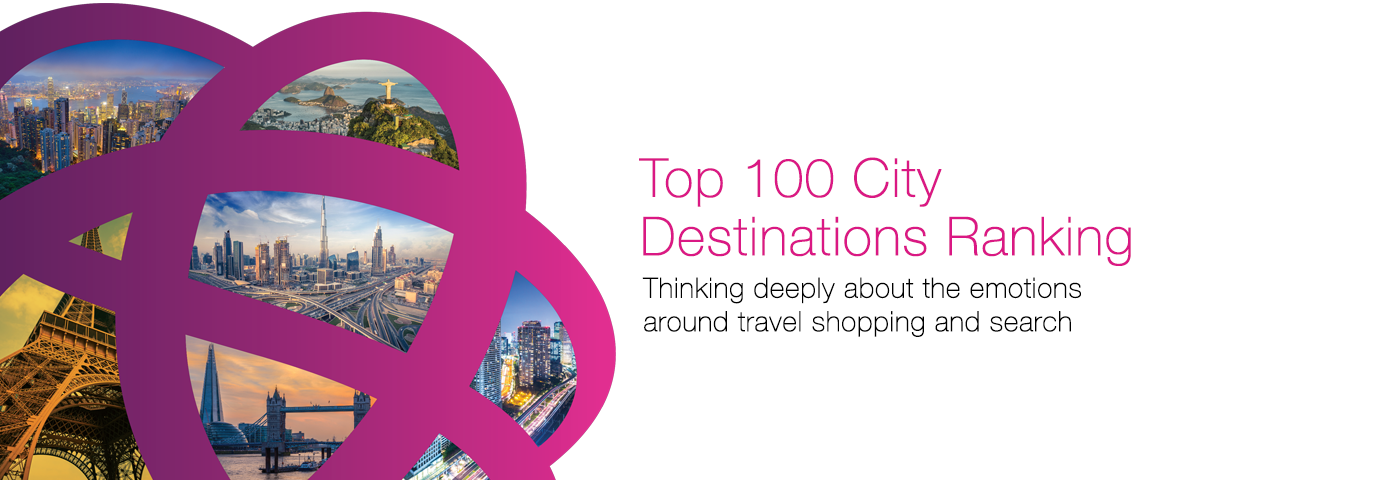The travel and tourism industry needs to be aware that facial and emotional recognition software will become advanced enough to influence travellers’ decisions, says the Top 100 City Destination Ranking WTM London 2017 Edition.
The report, from Euromonitor International, highlights current initiatives from Expedia and Accor to back its claim.
“Brands and advertisers will increasingly move towards reading consumers’ emotional and physical responses without filters, in situations such as shopping, searching for a holiday, or when arriving at a hotel reception after a long flight,” it states.
AccorHotels worked with startup Travelsify to launch “MoodMatch” this March, described as an inspirational new search experience based entirely on the moods and experiences of travellers.
Travelsify has created a HotelDNA score for 1,000 AccorHotels properties based on its analysis of all guest and expert comments posted about the properties online. Travelsify says there are 34 different components to a HotelDNA score. Accor’s home page allows users to search for these properties by mood rather than destination. The results show a selection of hotels with the match percentage between the moods chosen by the user and the DNA score.
Meanwhile Expedia Inc is using facial recognition software to analyse how users respond to its mobile and web brands. Its Usability Labs runs test where sensors are attached to research subjects’ faces, giving observers insight into their emotions as they navigate the sites.
The ability for brands across all verticals to access the technology required to run such tests is becoming more accessible as more startups enter the fray. Euromonitor points out that Apple has acquired Emotient, a San Diego-based startup analyzing facial expressions to detect emotions. Elsewhere, Affectiva, one of the many businesses coming out of Massachusetts Institute of Technology, offers “emotion as a service” by applying machine-learning algorithms to facial responses to generate results which show the emotion of a user.
Facial recognition is also seen in context of improving the security and efficiency of travel. At a government level the US is stepping up its implementation and use of facial recognition at its border control and airports, while Delta Air Lines is testing facial recognition scanners at its check-in kiosks, to ensure the traveller’s face matches their passport photo.
The report goes on to suggest that the next development could be software which can read brain activity. San Francisco-based Emotiv already builds “brain wearables [which] offer access to advanced brain monitoring and cognitive assessment technologies at affordable price points.”
While facial recognition is growing and brain activity tracking is in its infancy, voice recognition is relatively established and mainstream. The reports says how brands such as Expedia and Kayak have apps through which consumers can receive information about flights, hotels and make bookings through Alexa, while hotel chains such as Marriott are using Alexa as virtual concierges, and for voice-controlled lights, room temperature and music.
WTM London, Senior Director, Simon Press, said: “Innovations around voice, facial and emotional recognition are taking place around speeding up. Travel has always been at the forefront of new tech and with brands such as Expedia and Accor already heavily involved in the recognition space, all travel brands, supplier or destination should pay close attention.”
-ends-
About World Travel Market
World Travel Market (WTM) portfolio comprises five leading B2B events across four continents generating more than $7bn of industry deals. The events are;
WTM London, the leading global event for the travel industry, is the must-attend three-day exhibition for the worldwide travel and tourism industry. Around 51,500 senior travel industry professionals, government ministers and international media visit ExCeL – London every November generating around £2.8 billion of travel industry contracts. http://london.wtm.com/. Next event: 6-8 Nov 2017 – London.
International Golf Travel Market (IGTM) now in its 20th edition, is the meeting place for the global B2B golf travel community. More than 600 golf tourism suppliers join 350 pre-qualified buyers and 100 international press for four days of unmissable pre-scheduled appointments, exclusive networking opportunities and invaluable industry and trend updates. Taking place in a different destination every year, IGTM brings together 1,400 golf tourism professionals from over 65 countries. http://igtm.wtm.com/. Next event: 11-14 Dec 2017 – Cannes.
WTM Latin America now in its fifth edition attracts about 9,000 unique senior executives. The event generates US$ 370 million of new business. Taking place in Sao Paulo Brazil, this show attracts a global audience to meet and shape the direction of the travel industry. More than 7,000 unique visitors attend the event to network, negotiate and discover the latest industry news. http://latinamerica.wtm.com/. Next event: 3-5 April 2018 – Sao Paulo.
WTM Africa launched in 2014 in Cape Town, South Africa. Nearly 5,000 travel industry professionals attend Africa’s leading inbound and outbound travel and tourism market. WTM Africa delivers a proven mix of hosted buyers, media, pre-scheduled appointments, on-site networking, evening functions and invited travel trade visitors. http://africa.wtm.com/. Next event: 18-20 April 2018 – Cape Town.
Arabian Travel Market (ATM) is the leading, international travel and tourism event in the Middle East for inbound and outbound tourism professionals. ATM 2017 attracted almost 40,000 industry professionals, agreeing deals worth US$2.5bn over the four days. The 24th edition of ATM showcased over 2,500 exhibiting companies across 12 halls at Dubai World Trade Centre, making it the largest ATM in its 24-year history. www.arabiantravelmarketwtm.com Next event 22-25 April 2018 – Dubai.


